Doggy Dinner Dilemma: Can Dogs Eat Cat Food, or Is It A Forbidden Feast?

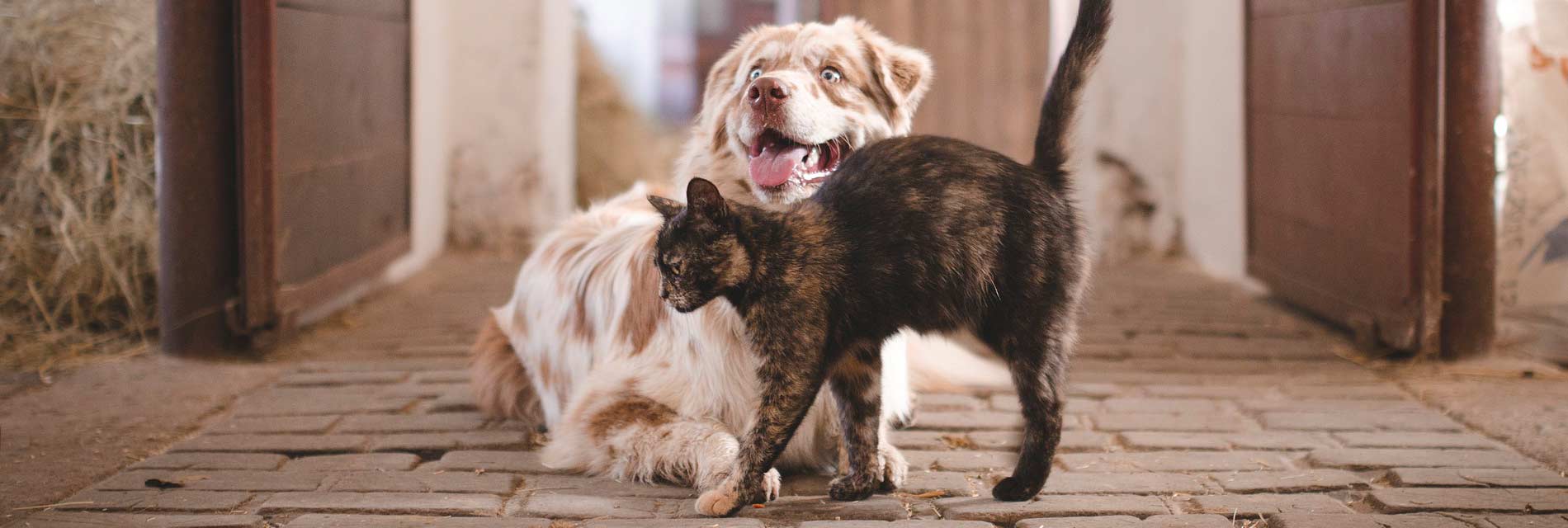
If you are a pet parent to a cat and a dog at the same time, then you probably know how much dogs love chomping on cat food. You may have even had to stop your dog from wolfing down your cat’s dinner once or twice. It may have made you wonder at some point, ‘can dogs eat cat food?’
After all, both cats and dogs are carnivore. So, it might seem logical to assume that cat food would be safe for dogs as well. The short answer to the question ‘can dog eat cat food?’ is Yes, they cab . A nibble or two of the cat food won’t harm your dog. However, it cannot and should not be a permanent part of daily routine for dog.
This is because despite sharing some dietary preferences (protein-rich food like meat and fish), dogs and cats have very different nutritional requirements. In this article, we will talk about the nutritional differences between dog and cat food and explore can dogs eat food or whether it is a recipe for digestive distress. So, let’s dive in.
Nutritional Requirements of Dogs Vs Cats
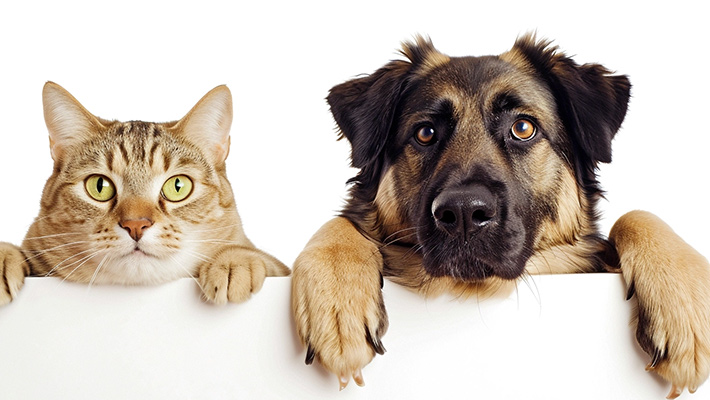
Before talking about dogs eating cat food, let’s first learn a bit more about the difference between the nutritional requirements of dogs and cats. It will help you to get the answer to the question, “is cat food bad for dogs?”
Dogs are omnivores, whereas cats are obligate carnivores. This means that dogs require a varied diet consisting of meat or other protein-rich food, grains, vegetables, and fruits to thrive.
On the other hand, cats need a diet that contains a much higher amount of animal-based protein, such as chicken, turkey, fish, or beef. In addition to animal protein, a cat’s diet should also have essential fatty acids, such as omega-3 and omega-6 (found in fish oil and flaxseed oil), Vitamin A, and specific amino acids like Taurine.
Hence, if you wanted to know, ‘can i feed cat food to a dog?’ the answer is no. This is because cats and dogs have very different dietary requirements. Hence, there is also a very significant difference in the composition of dog and cat food. Cat food is typically formulated to contain higher levels of certain nutrients, such as taurine, which is essential for feline health.
Dogs, on the other hand, have different requirements and may not be able to properly metabolize these nutrients. This can lead to imbalances and deficiencies in your dog’s diet, potentially causing long-term health issues. So, if you want to know if it is okay for dogs to eat cat food, then the brief answer is no, it is not ok for dogs to eat cat food in large amounts.
Why Do Dogs Find Cat Food So Tempting?
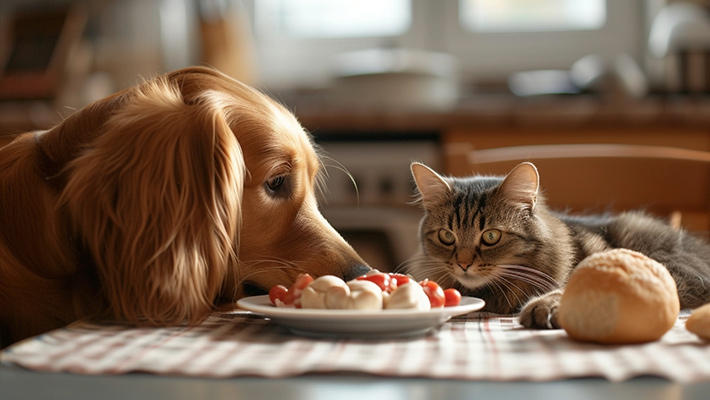
You are probably wondering why your dog is so attracted to cat food. This is because, compared to dog food, it contains a higher amount of protein and fat content. As a result, it packs in a more intense meaty aroma and flavor, making it highly palatable to dogs.
Moreover, because of the high protein and fat content, cat food is more flavorful and aromatic than dog food. Our canine companions, being opportunistic eaters with a long history of scavenging for food, are naturally drawn to the strong smells and tasty flavors of cat food.
So, Can A Dog Eat Cat Food?
While it may be tempting to let your dog indulge in a feline feast, there are several dangers associated with dogs regularly consuming cat food. One of the main concerns is that cat food tends to be higher in fat and protein compared to dog food.
Dogs have different metabolic rates and nutritional needs, and excessive intake of fat and protein can lead to weight gain, digestive issues, and other health problems.
Can Cats Have Dog Food?
Cats can nibble on a small amount of dog food occasionally without serious harm. It’s not toxic to them. However, dog food should not be a regular part of a cat’s diet for a few reasons:
Nutritional Imbalance: Dog food lacks the essential nutrients that cats need. This includes taurine, a crucial amino acid for heart and eye health, and arachidonic acid, a fatty acid important for skin and vision. As a result, due to deficiency of essential nutrients, it can be harmful in the long run and cause health issues like malnutrition.
Lower Protein Content: Dog food generally has a lower protein content than cat food, which doesn’t meet a cat’s high protein requirement as an obligate carnivore.
Digestive Issues: Cat stomachs are designed to digest a high protein, meat-based diet. Regular consumption of dog food formulated for omnivorous dogs can lead to digestive problems in cats.
Risks Associated With Dogs Eating Cat Food On A Regular Basis
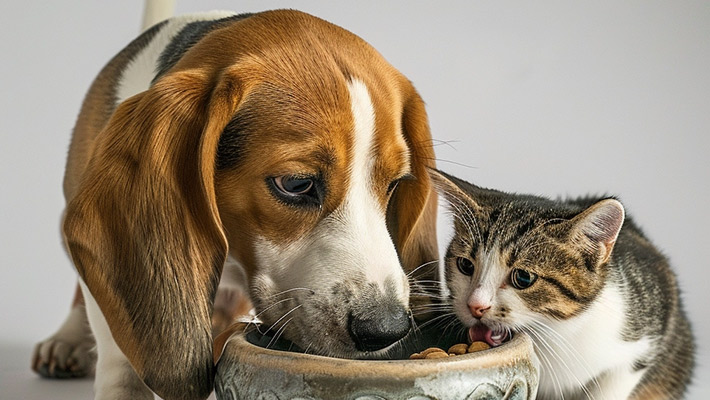
Feeding cat food to your dog on a regular basis can have several negative consequences for their health. Some of the risks and concerns that all pet parents should be aware of are as follows:
Nutritional Imbalance
Cat food is formulated to meet the specific dietary needs of cats, including higher levels of protein, fat, and certain nutrients like taurine. Dogs have different nutritional requirements, and long-term consumption of cat food can lead to an imbalance in their diet, potentially causing health issues.
Obesity
Cat food is often higher in calories and fat content compared to dog food. Continuous consumption of calorie-dense cat food can lead to weight gain and obesity in dogs. This can contribute to various health problems such as joint issues, diabetes, and heart disease.
Digestive Upset
Dogs and cats have different digestive systems. Cat food tends to be richer and may contain ingredients that are harder for dogs to digest. Regular consumption of cat food can lead to gastrointestinal issues in dogs, including diarrhea, vomiting, and discomfort.
Pancreatitis
Cat food is often higher in fat content, and excessive fat intake can increase the risk of pancreatitis in dogs. Pancreatitis is an inflammation of the pancreas that can cause severe abdominal pain, vomiting, diarrhea, and potentially life-threatening complications.
Nutrient Toxicity
There are certain nutrients that are essential for cats, such as vitamin A or arachidonic acid. But these nutrients can be harmful to dogs when consumed in excess. Regular intake of cat food, which is formulated with these nutrients for cats, may lead to nutrient toxicity in dogs.
Allergies or Sensitivities
Dog food and cat food formulations differ. Moreover, dogs may have specific dietary sensitivities or allergies to ingredients commonly found in cat food, such as fish or specific proteins. Regular exposure to these allergens through cat food can trigger allergic reactions or exacerbate existing allergies in dogs.
Thus, if you have both a dog and a cat in your household, it’s essential to keep their food separate to prevent your dog from indulging in the forbidden feline feast.
How to Stop Dogs from Eating Cat Food?
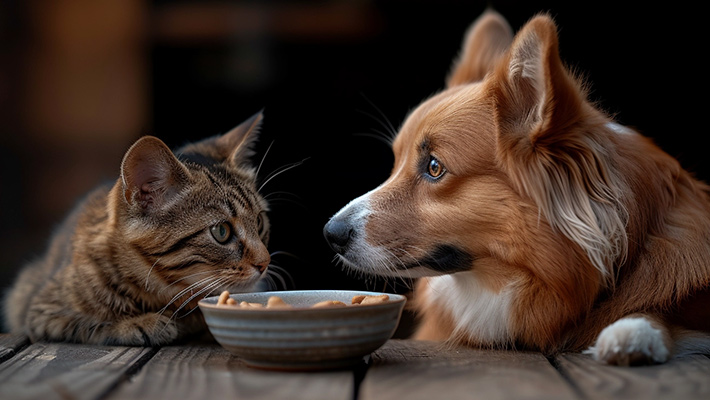
If you have a dog that just can’t resist the allure of cat food, there are several strategies you can employ to keep them from indulging. Firstly, it’s important to separate your dog’s feeding area from your cat’s. Place their food bowls in different rooms or use barriers to create separate feeding spaces. This will prevent your dog from having easy access to the cat’s food.
You can also try feeding your pets at different times. Cats are known for their ability to graze throughout the day, while dogs are typically fed on a schedule. Hence feed your cat smaller, more frequent meals. This way, you can reduce the amount of food left available for your dog to steal.
Training your dog to respond to commands such as “leave it” or “stay” can also be helpful. With consistent training and positive reinforcement, you can teach your dog to resist the temptation of cat food, even when it’s within reach.
Alternatives to Cat Food for Dogs
If you’re looking for alternative options to cat food for your dog, there are several choices available. One option is to feed your dog commercially available dog food. It is designed to mimic the taste and texture of cat food. These products are formulated to provide a similar sensory experience for your dog without compromising their nutritional needs.
Another alternative is to prepare homemade dog food using recipes that are specifically tailored to meet your dog’s dietary requirements. However, it’s important to consult with a veterinary nutritionist. They can help you ensure that the homemade diet is balanced and provides all the necessary nutrients.
Final Thoughts
While, it may be tempting to let your dogs eat cat food, you should remember that cat food is formulated for feline nutrition. Therefore it may not meet your dog’s dietary needs. So avoid feeding cat food to your furbaby on a regular basis. This is because it can lead to weight gain, digestive issues, and imbalances in their nutritional intake.
Therefore, to ensure your dog’s health and well-being, it’s crucial to provide them with a balanced diet. You also need to ensure that it is specifically designed for dogs. If you want to know “how much food should I feed my dog,” then follow the feeding guidelines provided on the commercial dog food bags.
In addition, if you have any questions about your dog’s diet or can dogs have cat food, then consult with your veterinarian as soon as possible. They can provide personalized advice based on your dog’s individual needs and help you make informed decisions about their diet. Your veterinarian can also recommend specific dog food brands that are suitable for your dog’s age, breed, and any specific health conditions they may have.
So next time your dog gives you those longing eyes while staring at the cat’s food, don’t give in. Remember the risks involved and make the right choice for your four-legged companion’s health.





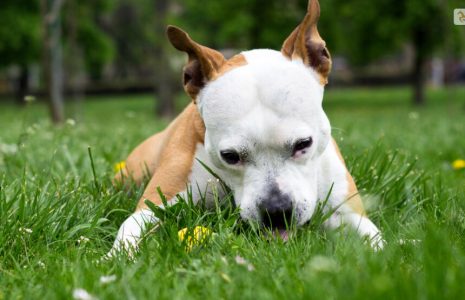
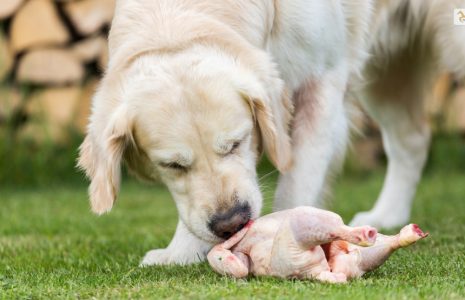
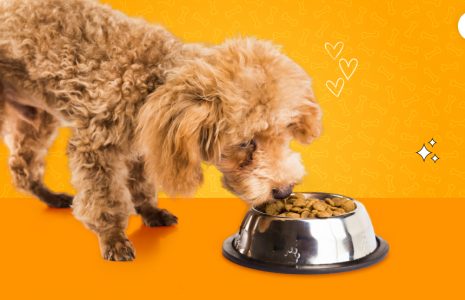
Leave A Comment